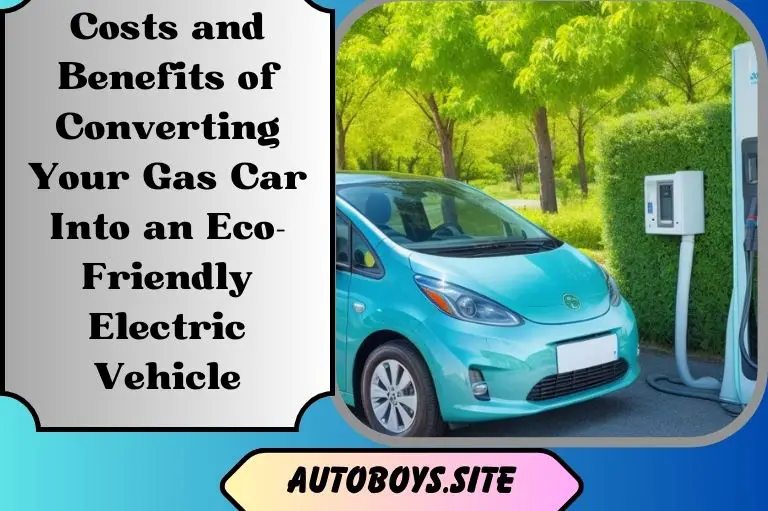The Costs and Benefits of Converting Your Gas Car Into an Eco-Friendly Electric Vehicle
Have you ever dreamed of turning your gas-powered sedan into an eco-friendly electric vehicle? You’re not alone. With climate change looming as an existential threat, environmentally-conscious drivers everywhere are looking for ways to reduce their carbon footprint and save money on expensive fuel costs. Converting a traditional internal combustion engine vehicle to run on electricity is one of the best ways to go green—and the good news is, it’s easier than you might think.
Assessing if Converting Your Gas Car To Electric Is Right for You
Converting your gas-guzzling car into an eco-friendly electric vehicle is an exciting endeavor for the environmentally-conscious driver. The prospect of reducing your carbon footprint and lowering fuel costs is appealing to many, but is converting your gas car to electric the right choice for you?
Costs to Consider
The cost to convert a gas car to an electric one typically ranges from $5,000 to $20,000, depending on the make, model, and age of your vehicle. The battery alone can cost between $5,000 to $10,000. While the initial costs may seem high, converting to electric can save you money on gas and maintenance in the long run. Electric cars have fewer moving parts so they tend to be more reliable and cheaper to repair than gas-powered vehicles.
Environmental Benefits
By converting your gas car to electric, you’ll be doing your part to reduce emissions and fight climate change. According to the EPA, the average electric vehicle produces zero direct emissions, resulting in lower greenhouse gas emissions compared to the average new gas vehicle. You’ll also decrease your dependence on oil for fuel.
Improved Performance
In addition to saving money and helping the planet, converting your gas car to electric can significantly improve your vehicle’s performance. Electric motors provide instant torque, faster acceleration, and a quieter ride than traditional combustion engines.
So for the environmentally and budget-conscious driver looking to improve their vehicle’s performance, converting a gas car to electric could be a smart choice. While the initial costs may be high, the long-term benefits to your wallet, the planet, and your driving experience make it worth considering. The future is electric – will you join the revolution?
How Converting to Electric Can Benefit the Environment
Converting your gas guzzler to an electric vehicle is one of the best things you can do for the environment.
Lower Emissions
Electric cars produce zero direct emissions, so by switching from gas to electric you’ll be drastically reducing your carbon footprint. According to the U.S. Department of Energy, the average electric vehicle produces 60-68% fewer greenhouse gas emissions over its lifetime compared to a gas-powered car.
Electric vehicles also emit fewer harmful air pollutants like nitrogen oxides, hydrocarbons, and particulate matter. This means that as more people drive EVs, the air in our cities and towns will become cleaner and healthier for everyone.
A Greener Grid
The electricity that powers EVs is becoming greener too. More and more of our electricity is being generated from renewable sources like solar and wind. So over time, the environmental benefits of driving an EV will only increase.
Energy Independence
By powering your vehicle with electricity instead of oil, you’ll be reducing our dependence on foreign oil and supporting the growth of sustainable domestic energy sources. This helps ensure a more secure energy future for our nation.
Fewer Parts, Less Waste
Electric vehicles have fewer moving parts than gas-powered cars, so they tend to require less maintenance and repair. This means fewer replacement parts need to be manufactured and less waste ends up in landfills.
Overall, transitioning from a gas vehicle to an electric one is one of the most impactful steps you can take to fight climate change and build a healthier, more sustainable future for our planet. The environmental benefits are huge, and the rewards of driving an eco-friendly EV are well worth the effort. Our Earth will thank you.
Breaking Down the Costs of Converting a Gas Car to Electric
Converting a gas-powered vehicle to an eco-friendly electric car is an exciting endeavor that comes with many benefits to you and the planet. While the initial costs may seem high, the long-term savings in fuel and maintenance make it worth the investment for many environmentally-conscious drivers.
The Costs
The total cost to convert a gas vehicle to electric typically ranges from $7,000 to $9,000. The specific expenses include:
- Electric motor and controller: Around $3,000 to $6,000. More powerful motors and advanced controllers will be on the higher end of that range.
- Batteries: $3,000 to $10,000 or more depending on the battery chemistry and capacity. Lithium-ion batteries are popular but also pricey. Lead-acid or nickel-metal hydride batteries are more affordable options.
- Charging equipment: At least $500 to $1,000 for a level 2 charger installed in your home. Higher-powered fast chargers for public use or commercial fleets will cost $10,000 or more.
- Additional parts like cables, mounts, throttles, and switches: Around $500 to $3,000 total depending on how much of the conversion you do yourself versus paying a mechanic.
The costs can seem steep at first, but when you consider the thousands of dollars saved each year on gas and maintenance, an electric vehicle conversion will often pay for itself over time through fuel savings alone. And that’s not even factoring in potential tax incentives or rebates for eco-friendly vehicle owners.
The Benefits
Converting your gas guzzler to an electric vehicle has huge benefits for both the environment and your wallet. You’ll instantly:
- Reduce your carbon footprint by not burning fossil fuels.
- Save big on fuel costs since electricity is cheaper than gas.
- Lower maintenance costs since electric vehicles have fewer moving parts.
- Qualify for federal, state, and local incentives for eco-friendly vehicle owners.
- Enjoy a smoother, quieter driving experience.
- Increase the value and appeal of your vehicle.
Going green has never felt so good. Converting your vehicle to electric is a win-win for you and the planet. While the initial investment may pinch your purse strings, the long-term rewards to the environment and your finances make it well worth the cost.
Step-by-Step Process of Installing an Electric Motor
Converting a gas-powered car to an electric vehicle is an exciting project that anyone can take on with some mechanical know-how and a passion for building eco-friendly machines. Here’s a step-by-step guide to switching out your gas engine for an electric motor.
Finding an Electric Motor
The first step is to source a high-quality electric motor. Look for a motor with similar horsepower to your existing gas engine so you’ll have comparable performance. Popular choices for conversions include AC induction motors or DC brushed motors, which provide lots of torque for accelerating and climbing hills. You’ll want to find a reputable retailer that specializes in EV parts and components.
Installing the Motor
With the motor in hand, it’s time to install it in place of your gas engine. This typically requires removing components like the exhaust system, fuel tank, radiator, and of course, the internal combustion engine itself. The electric motor then mounts to the transmission using an adapter plate. While this sounds straightforward, it does require some mechanical skill and knowledge to execute properly. If you’re not highly experienced working on cars, it’s best to hire an expert to handle the installation.
Adding Batteries and a Charger
No electric vehicle would be complete without a battery pack and charger. Lithium-ion batteries are the most popular choice, providing lots of power for their size and weight. You’ll want enough battery capacity to give your vehicle a useful range per charge, typically 50-100 miles or more. The battery pack also needs a charger so you can recharge when the batteries are depleted. Install the batteries, battery management system, and charger according to the recommendations from the manufacturers.
Converting a traditional gas vehicle to run on electricity is an eco-friendly modification that reduces emissions and lowers fuel costs. While it does require an investment of both time and money, the result is an exciting custom EV you’ll love driving every day. Going green has never been so rewarding!
Other Eco-Friendly Car Modifications to Consider
Converting your gas-powered car to an electric vehicle is an exciting eco-friendly modification to consider. Not only will you save money on fuel costs in the long run, but you’ll also do your part to reduce emissions and help the environment. Here are some other green modifications you can make to your car:
Install Solar Panels
Adding solar panels to your car’s roof is a great way to harness the power of the sun. The panels can help charge your car’s battery when it’s parked, reducing the need to plug in. Many DIY solar panel kits are available to get you started.
Upgrade to Eco-Friendly Tires
Did you know your tires can impact your car’s fuel efficiency? Upgrading to low-rolling-resistance tires, which have special compounds and tread designs to reduce friction, can improve your gas mileage by up to 10 percent. Many major tire brands like Goodyear and Michelin offer eco-friendly tire options.
Use Synthetic Oils
Conventional motor oils are petroleum-based, but synthetic oils are made from purified chemicals. Synthetic oils provide better protection for your engine, especially in extreme temperatures. They also tend to last longer between oil changes. Popular synthetic oil brands include Mobil 1, Castrol Edge, and Valvoline.
Consider Biodiesel or Ethanol
If you’re not ready to fully convert your car to electric yet, blending biodiesel or ethanol into your regular fuel can still make a big difference. Biodiesel is made from vegetable oils and fats, while ethanol is made from corn and other plants. Using a blend like B20 (20% biodiesel, 80% petroleum diesel) or E85 (85% ethanol, 15% gasoline) can significantly lower emissions and support renewable fuel sources.
Many local gas stations now offer biodiesel, ethanol, and biodiesel/ethanol blends at the pump. Making these and other eco-friendly changes to your vehicle will get you one step closer to reducing your carbon footprint in an enthusiastic, do-it-yourself way. Every small improvement helps when it comes to creating a greener future for us all.
Tax Credits and Incentives for Electric Vehicle Conversions
Converting your gas-powered vehicle to an electric one can save you thousands of dollars in fuel costs over its lifetime. Even better, the government wants to help you make the switch by offering tax credits and incentives for electric vehicle conversions.
Federal Tax Credit
The federal government currently offers up to $7,500 in tax credits for converting your vehicle to run on electricity. This credit applies to the costs of the actual conversion, including the electric motor, batteries, and related equipment. The tax credit amount depends on the size and type of your vehicle. Cars and light trucks can qualify for up to $7,500, while larger vehicles like buses and trucks are eligible for up to $15,000.
State Rebates and Incentives
Many states also offer their rebates, grants, and tax incentives for converting vehicles to electric power or other alternative fuels. These incentives can range from $500 up to $5,000 or more, depending on the state and type of vehicle. Some states like California, Colorado, and Massachusetts are especially generous with rebates for eco-friendly vehicle conversions and modifications. It’s worth checking with your state’s Department of Transportation or Energy to see what kinds of incentives may be available to help fund your electric vehicle conversion.
Additional Benefits
Aside from the cost savings, converting your gas vehicle to electric has many environmental benefits. You’ll be reducing emissions and your dependence on oil for fuel. An electric vehicle conversion can extend the useful life of your vehicle by many years. You may also qualify for special parking spaces and toll discounts offered to eco-friendly vehicle owners.
Converting your gas-powered car to run on electricity is easier and more affordable than ever. With available tax credits and rebates, you can offset much of the cost of an electric conversion and start reaping the benefits of driving green. Lower fuel costs, reduced emissions, and government incentives—what’s not to love about an electric vehicle conversion? The future is electric, so why not switch today?
Finding a Reputable Shop to Convert Your Car
Finding a reputable shop to convert your gas guzzler into an eco-friendly EV is key to a successful switch. Some well-known conversion shops with years of experience can transform your vehicle into an electrified ride.
LegacyEV is a reputable shop that specializes in converting classic and iconic vehicles into EVs. With over 25 years of experience, their expert technicians are pioneers in the EV conversion industry. They offer full conversions for popular vehicles like the VW Beetle, Porsche 911, Ford Mustang, and Chevy Camaro. After a LegacyEV conversion, your newly electrified vehicle will have a range of 100-200 miles per charge.
On the West Coast, Bream’s shop in San Diego has been converting gas-powered cars to EVs since the 1990s. They’re popular for restoring and electrifying vintage VW vans, trucks, and beetles. Bream uses high-quality, name-brand components to ensure reliable and high-performance conversions. They also provide guidance on home charging installation and EV incentives.
Raleigh, based in North Carolina, converts modern vehicles like the Toyota Prius, Nissan LEAF, and Chevy Volt into fully electric vehicles. They remove the gas engine and install an electric powertrain and lithium-ion battery packs, extending the range up to 150 miles per charge. RaleighEV’s technicians are experts in EV technology and safety, and they offer a warranty on all conversion components.
Converting your gas vehicle to an EV at a certified shop provides peace of mind. Reputable conversion companies hire certified technicians, use approved components, and follow proper safety standards. They can also help you take full advantage of federal and state incentives for EVs. While DIY conversions are possible, for the average owner it’s best left to the professionals. Making the switch to an eco-friendly EV has never been easier thanks to experienced conversion shops ready to do the work for you.
Safely Maintaining Your New Electric Vehicle
Converting your gas-powered vehicle to an electric vehicle is an exciting project that will benefit both the environment and your wallet. The process does require technical skills and safety precautions to ensure it’s done properly, but the result is well worth the effort.
Once the conversion is complete, maintaining your new eco-friendly ride is a breeze. Unlike gas-powered cars, electric vehicles don’t require oil changes or tune-ups. However, it’s still important to routinely check essential components like the brakes, tire pressure, and charging equipment.
Charging your EV
The key to keeping an electric vehicle on the road is properly charging the battery. Charge your EV overnight while you sleep to ensure you have enough range for your daily needs. Never run the battery down to empty, as this can reduce its overall lifespan. It’s best to charge the battery when it reaches 20-30% capacity.
High voltage safety
Electric vehicle batteries contain high voltage, so safety should always come first during maintenance and repair. Only certified technicians should handle or service the battery and related components. Be sure to wear proper insulated gloves and safety glasses when working on or around the battery. High voltage shocks can be lethal, so take every precaution.
Braking differently
Regenerative braking systems on EVs use friction to recharge the battery, not just slow the vehicle. This means the braking feel will be different from a gas-powered car. Take time to get used to the different braking sensations to ensure safe driving. Brake pads and rotors will still need to be checked and replaced when worn, just less frequently.
Converting to an eco-friendly electric vehicle is rewarding in many ways. While the conversion requires an investment of time and money, the long-term benefits to the environment and your budget make it worthwhile. By following essential safety and maintenance steps, you’ll be able to enjoy your new EV for years to come.
Conclusion
While converting a gas car to an electric one may seem challenging, the rewards are well worth the effort. You’ll be doing your part to reduce emissions and create a healthier planet for future generations. You’ll also save thousands per year on fuel costs and enjoy a quieter, smoother driving experience. So start dreaming of a greener future and all the places your eco-friendly electric vehicle will take you. The planet will thank you for it! There’s never been a better time to go green.







